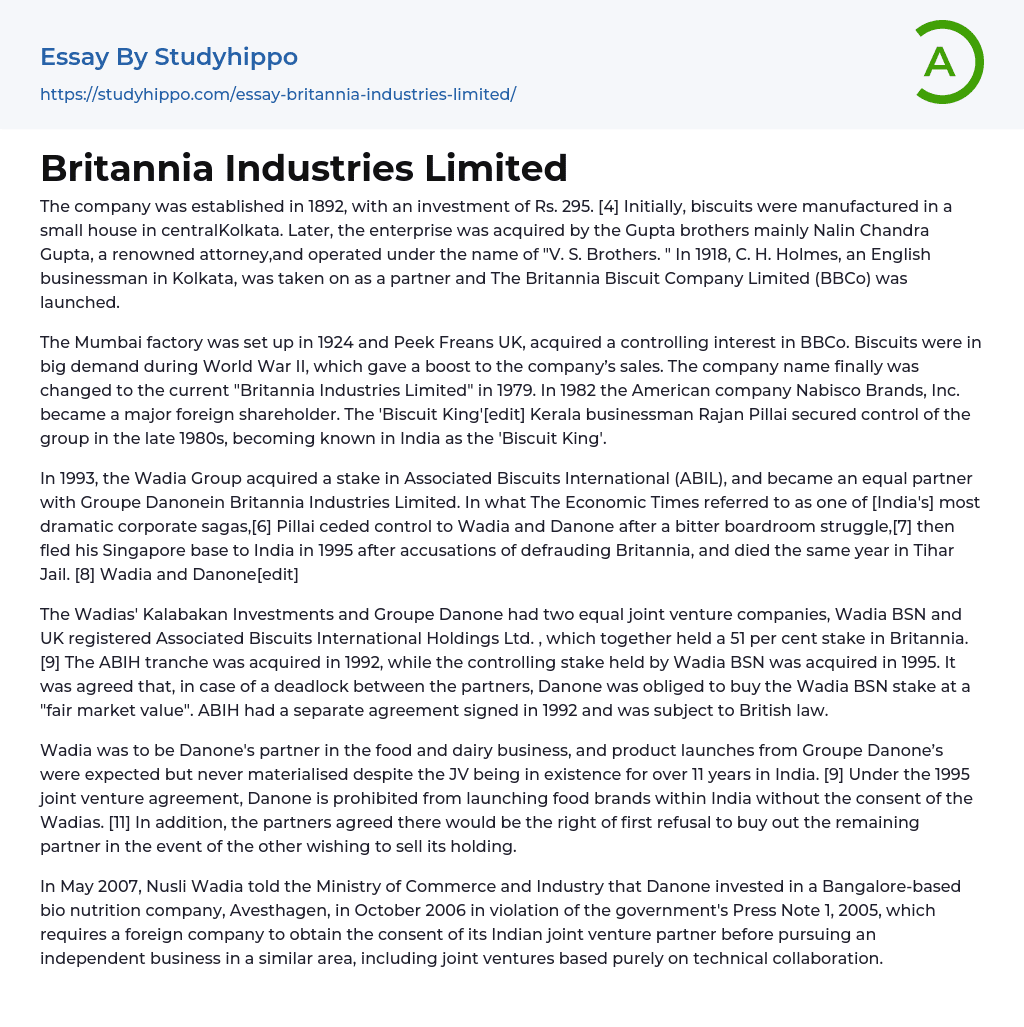The company was established in 1892, with an investment of Rs. 295. [4] Initially, biscuits were manufactured in a small house in centralKolkata. Later, the enterprise was acquired by the Gupta brothers mainly Nalin Chandra Gupta, a renowned attorney,and operated under the name of "V. S. Brothers. " In 1918, C. H. Holmes, an English businessman in Kolkata, was taken on as a partner and The Britannia Biscuit Company Limited (BBCo) was launched.
The Mumbai factory was set up in 1924 and Peek Freans UK, acquired a controlling interest in BBCo. Biscuits were in big demand during World War II, which gave a boost to the company’s sales. The company name finally was changed to the current "Britannia Industries Limited" in 1979. In 1982 the American company Nabisco Brands, Inc. became a major foreign shareholder. The 'Biscuit King'[edit] Kerala businessman R
...ajan Pillai secured control of the group in the late 1980s, becoming known in India as the 'Biscuit King'.
In 1993, the Wadia Group acquired a stake in Associated Biscuits International (ABIL), and became an equal partner with Groupe Danonein Britannia Industries Limited. In what The Economic Times referred to as one of [India's] most dramatic corporate sagas,[6] Pillai ceded control to Wadia and Danone after a bitter boardroom struggle,[7] then fled his Singapore base to India in 1995 after accusations of defrauding Britannia, and died the same year in Tihar Jail. [8] Wadia and Danone[edit]
The Wadias' Kalabakan Investments and Groupe Danone had two equal joint venture companies, Wadia BSN and UK registered Associated Biscuits International Holdings Ltd. , which together held a 51 per cent stake in Britannia. [9] The ABIH tranche was acquired in 1992,
while the controlling stake held by Wadia BSN was acquired in 1995. It was agreed that, in case of a deadlock between the partners, Danone was obliged to buy the Wadia BSN stake at a "fair market value". ABIH had a separate agreement signed in 1992 and was subject to British law.
Wadia was to be Danone's partner in the food and dairy business, and product launches from Groupe Danone’s were expected but never materialised despite the JV being in existence for over 11 years in India. [9] Under the 1995 joint venture agreement, Danone is prohibited from launching food brands within India without the consent of the Wadias. [11] In addition, the partners agreed there would be the right of first refusal to buy out the remaining partner in the event of the other wishing to sell its holding.
In May 2007, Nusli Wadia told the Ministry of Commerce and Industry that Danone invested in a Bangalore-based bio nutrition company, Avesthagen, in October 2006 in violation of the government's Press Note 1, 2005, which requires a foreign company to obtain the consent of its Indian joint venture partner before pursuing an independent business in a similar area, including joint ventures based purely on technical collaboration.
Danone argued that Press Note 1 did not apply to it as it did not have a formal technology transfer or trademark agreement with Avesthagen, and that its 25% holding in Britannia was indirect. [13] Wadia also filed a case in the Bombay High Court for a breach of a non-competition clause in that connection. The court ordered Danone not to alienate, encumber or sell shares of Avestagen.
In September 2007, the Foreign
Investment Promotion Board of India rejected Danone's claims that it did not need a non-compete waiver from the Wadias to enter into business in India alone. [15] In June 2006, Wadia claimed Danone had used the Tiger brand to launch biscuits in Bangalore. [12] After a prolonged legal battle, Danone agreed to sell its 25. 48% stake in Britannia to Leila Lands, which is a Wadia group entity based in Mauritius, and quit this line of business. The deal was valued at $175–200 m. With this buy-out, Wadia holds a majority stake of 50. 96%.
- Chief Executive Officer essays
- Convenience Store essays
- Firm essays
- Training And Development essays
- Unilever essays
- Variable Cost essays
- Virgin Group essays
- Bargaining essays
- Entity essays
- Pest analysis essays
- Bankruptcy essays
- Earnings essays
- Tata Group essays
- S corporation essays
- Secretary essays
- Premise essays
- Jurisprudence essays
- Social Injustice essays
- Juvenile Justice essays
- Leadership and Management essays
- Change Management essays
- Project Management essays
- Knowledge Management essays
- Operations Management essays
- Quality Management essays
- Risk Management essays
- Scientific Management essays
- supply chain management essays
- Performance Management essays
- Time Management essays
- Brand Management essays
- Total Quality Management essays
- Risk essays
- Manager essays
- Leadership essays
- Business Ethics essays
- Board Of Directors essays
- Product Management essays
- Comparative Analysis essays
- Decision Making essays
- Dispute Resolution essays
- Stress Management essays
- Business Management essays
- Brand Equity essays
- Branding essays
- Nike, Inc. essays
- Market share essays
- Razor essays
- Being A Leader essays
- Servant Leadership essays




